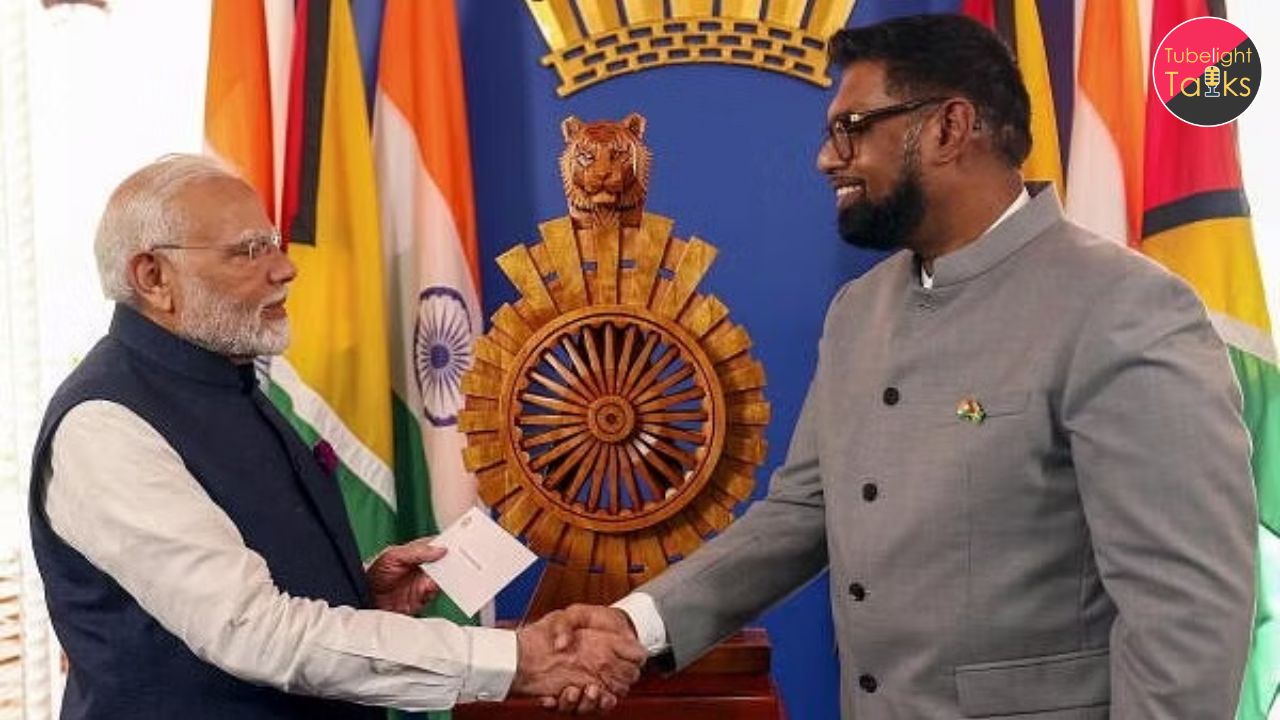India-Guyana Relations: A Historical and Modern Perspective
India and Guyana share a deep-rooted relationship that spans over 180 years. This bond, built on shared history, culture, and mutual cooperation, continues to thrive in the modern era. In this blog, we explore the historical ties, recent developments, and future prospects of India-Guyana relations.
Historical Ties
The connection between India and Guyana dates back to the early 19th century when the first Indian indentured laborers arrived in Guyana. This migration laid the foundation for a vibrant Indian community in Guyana, which has significantly influenced the country’s cultural and social landscape. The Indian Cultural Centre in Georgetown, established in 1972, plays a crucial role in promoting cultural exchange and mutual understanding.
Early Migration
Between 1838 and 1917, over 240,000 Indians were brought to Guyana to work on sugar plantations. These laborers endured challenging conditions but contributed immensely to Guyana’s economy and culture. Today, their descendants, who make up nearly 40% of Guyana’s population, continue to preserve their rich heritage through festivals, cuisine, and traditions.
Cultural Influence
The Indian community in Guyana has significantly influenced the cultural fabric of the nation.Festivals such as Diwali and Holi are celebrated with great enthusiasm, and Indian music, dance, and cuisine are integral to Guyanese culture. The Indian Cultural Centre plays a vital role in promoting cultural exchange and mutual understanding.
Recent Developments
In a historic visit, Indian Prime Minister Narendra Modi became the first Indian Prime Minister to visit Guyana in over 50 years. During his visit, Prime Minister Modi spoke before the Guyanese Parliament, emphasizing the profound and lasting bond that exists between the two countries. He emphasized the importance of democracy, humanity, and mutual growth, underscoring the shared values that bind India and Guyana.
Strengthening Diplomatic Ties
During the visit, several high-level meetings took place between Indian and Guyanese officials, focusing on enhancing bilateral relations. These meetings resulted in the signing of 10 Memorandums of Understanding (MoUs), covering areas such as hydrocarbons, agriculture, pharmaceuticals, digital payments, and cultural programs. These agreements pave the way for closer cooperation and mutual benefits.
Economic Cooperation
India and Guyana have identified key sectors for collaboration, including energy, trade, and investment. The two countries are working towards boosting trade and investment flows, with a particular focus on small and medium enterprises (SMEs). Guyana’s strategic location in the Caribbean region makes it an ideal partner for India in expanding its presence in the region.
Bilateral Cooperation
India and Guyana have fostered collaboration in various sectors, including trade, energy, healthcare, and cultural exchange. The two countries signed 10 MoUs during PM Modi’s visit, covering areas such as hydrocarbons, agriculture, pharmaceuticals, digital payments, and cultural programs. These agreements pave the way for closer cooperation and mutual benefits.
Trade and Investment
Trade between India and Guyana has seen significant growth in recent years, with India emerging as one of Guyana’s major trading partners. India’s exports to Guyana include machinery, pharmaceuticals, and textiles, while Guyana exports minerals, agricultural products, and timber to India. Both countries are working towards creating a more favorable business environment to attract investment and boost trade.
Energy Cooperation
One of the key areas of collaboration is energy. The MoU on Hydrocarbons Cooperation focuses on joint efforts in crude oil sourcing, natural gas collaboration, and infrastructure development. Guyana, with its vast reserves of oil and natural gas, offers immense potential for collaboration in the energy sector. India’s expertise in renewable energy can also help Guyana diversify its energy mix and reduce its dependence on fossil fuels.
Agricultural Development
The MoU on Bilateral Cooperationkya in Agriculture and Allied Sectors aims to promote sustainable farming practices and strengthen food security. Both countries are working on joint research and development projects to improve crop yields and enhance agricultural productivity. This collaboration will help Guyana develop its agricultural sector and ensure food security for its population.
Healthcare
Agreements in the healthcare sector include the Indian Pharmacopoeia Recognition and the Janaushadhi Scheme, which will improve medicine regulation and access to affordable healthcare in Guyana. India has also offered scholarships and training programs for Guyanese healthcare professionals, helping to build capacity and improve healthcare services in the country.
Digital Transformation
The MoU for INDIA STACK will help build capacity through training programs and pilot projects in e-governance and digital services. This collaboration will support Guyana in its efforts to modernize its public administration and improve the delivery of public services to its citizens. Digital transformation initiatives will also create new opportunities for entrepreneurship and innovation in Guyana.
Cultural Exchange
The Cultural Exchange Programme (2024-2027) will foster greater cooperation in arts, theatre, music, literature, and museums. This program will provide opportunities for artists and cultural practitioners from both countries to collaborate and share their talents. Cultural exchange initiatives will strengthen people-to-people ties and promote mutual understanding between India and Guyana.
Key Areas of Collaboration
- Energy Cooperation: The MoU on Hydrocarbons Cooperation focuses on joint efforts in crude oil sourcing, natural gas collaboration, and infrastructure development.
- Agricultural Development: The MoU on Bilateral Cooperation in Agriculture and Allied Sectors aims to promote sustainable farming practices and strengthen food security.
- Healthcare: Agreements in the healthcare sector include the Indian Pharmacopoeia Recognition and the Janaushadhi Scheme, which will improve medicine regulation and access to affordable healthcare in Guyana.
- Digital Transformation: The MoU for INDIA STACK will help build capacity through training programs and pilot projects in e-governance and digital services.
- Cultural Exchange: The Cultural Exchange Programme (2024-2027) will foster greater cooperation in arts, theatre, music, literature, and museums.
Future Prospects
The visit of PM Modi marks a significant milestone in India-Guyana relations, reflecting India’s commitment to strengthening ties with the Caribbean and South American regions. The two countries are poised to deepen their cooperation in various sectors, contributing to the growth and development of both nations.
Strategic Partnership
India and Guyana are exploring new avenues for strategic partnership, including defense and security cooperation. Both countries recognize the importance of regional stability and are working towards enhancing their defense capabilities through joint training and capacity-building programs.
Education and Skills Development
India has extended several scholarships and training programs to Guyanese students and professionals, helping to build capacity and enhance skills. Collaborative efforts in education and skills development will empower the youth of Guyana and create new opportunities for economic growth.
Tourism and Hospitality
Tourism is another promising area for collaboration. Both countries are working towards promoting tourism and hospitality, with a focus on cultural and eco-tourism. Guyana’s rich biodiversity and natural beauty, combined with India’s expertise in tourism management, can attract more visitors and boost the tourism sector.
Environmental Sustainability
India and Guyana are committed to addressing climate change and promoting environmental sustainability. Joint efforts in renewable energy, afforestation, and sustainable development will help both countries achieve their environmental goals and contribute to global efforts to combat climate change.
Conclusion
India and Guyana share a unique bond that has stood the test of time.The connection between these two nations, rooted in historical ties and strengthened by contemporary partnerships, continues to thrive. As they move forward, the focus on democracy, humanity, and mutual growth will ensure a bright future for India-Guyana relations.
To achieve salvation, or Moksha, according to spiritual teachings like those of Sant Rampal Ji Maharaj, one must follow a path of true devotion and righteousness. Seeking guidance from a true Guru is essential, as the Guru provides the correct spiritual knowledge and practices.
Engaging in scripture-based worship, which includes reciting holy mantras and meditating regularly, is crucial. Living a righteous life by practicing truthfulness, non-violence, compassion, and self-discipline is important. One must also atone for past sins through sincere repentance and corrective actions. Selfless service to others, without expecting anything in return, is encouraged.
Additionally, dedicating time to connect with the divine presence through meditation fosters inner peace and spiritual growth. By adhering to these principles, an individual can work towards achieving salvation and eternal peace.











Discussion (0)